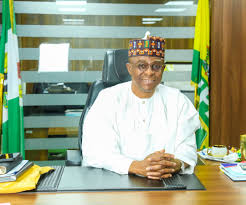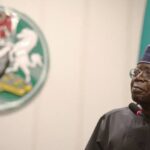The Nigerian Ports Authority (NPA) has set an ambitious revenue target of N1.279 trillion for the 2025 fiscal year—representing a 40 percent increase from its 2024 projection of N865 billion, which it has already exceeded with an actual revenue of N894.86 billion.
Managing Director of the NPA, Dr. Abubakar Dantsoho, made this known on Monday while presenting the Authority’s 2025 budget proposal before the Senate and House of Representatives Committees on Marine Transport.
Dr. Dantsoho also disclosed that the NPA remitted N400 billion to the Consolidated Revenue Fund (CRF) in 2024—nearly double the amount remitted the previous year.
According to him, the 2025 revenue projection is anchored on increased cargo throughput, higher ship traffic, improved port concession arrangements, and administrative charges. He provided a breakdown of expected earnings: N430 billion from cargo services, N544 billion from ship dues, N240 billion from port concession agreements, and N73 billion from administrative fees.
“This budget is more than just figures. It reflects our commitment to building a more efficient and globally competitive port system,” Dantsoho said.
Out of a proposed total expenditure of N1.14 trillion for 2025, the NPA has earmarked N778.46 billion—over 70 percent—for capital projects. These investments will focus on rehabilitating key port infrastructure in Calabar, Warri, and Burutu, upgrading towage services and channel depths, and enhancing compliance with international maritime security standards.
Dantsoho further noted that the revenue target was based on strategic initiatives including the full operationalisation of the Dangote Refinery’s marine terminal, expected to attract over 600 vessels annually through its Single Point Mooring (SPM) system. Other key drivers include the commissioning of upgraded terminals at the West Africa Container Terminal (WACT) and OMT, and the rollout of advanced automation systems such as the National Single Window, Port Community System (PCS), and Vessel Traffic Management System (VTMS).
He also linked the increase in cargo traffic to shifting global trade routes influenced by the ongoing Russia-Ukraine conflict.
“These investments in infrastructure and technology are not optional—they are essential if Nigeria’s ports are to remain regionally and globally competitive,” he added.
In their responses, lawmakers commended the NPA’s strong performance and forward-looking plans. Chairman of the Senate Committee on Marine Transport, Senator Wasiu Eshinlokun (APC, Lagos Central), urged the Authority to further improve operational efficiency and infrastructure, highlighting the strategic role of ports in economic development.
Other senators, including Iya Abbas (PDP, Adamawa Central), Victor Umeh (LP, Anambra Central), Amos Yohanna (PDP, Adamawa South), Kenneth Eze (APC, Ebonyi Central), and Abdul Ningi (PDP, Bauchi Central), applauded the NPA for surpassing its revenue targets. Senator Ningi described the presentation as “a well-prepared and data-driven document” and urged the NPA to support the Federal Government’s efforts to address fiscal deficits and reduce dependence on borrowing.
However, Senator Cyril Fasuyi expressed concern over the NPA’s proposed N1.1 trillion expenditure, describing it as excessive and calling for cost-cutting measures.
As the NPA advances with port modernisation and digitisation, expectations are high for the agency to strengthen its contribution to national revenue and play a transformative role in Nigeria’s maritime sector.









